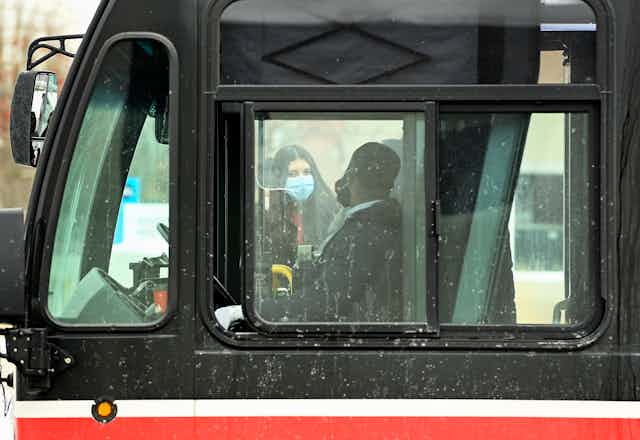In Ontario, where a third wave of COVID-19 is devastating the province, some of the people hardest hit by the pandemic have an additional battle to fight: stigmatization. That’s because the Ontario government has framed staying at home as a matter of personal responsibility when, in fact, it’s a luxury that many can’t afford.
Almost from the start of the pandemic, the Ontario government has been asking people to stay home. Premier Doug Ford has pleaded with the public to “do the right thing” and “stay home.” Solicitor General Sylvia Jones has also asked Ontarians “to use their personal responsibility” and “stay home and save lives.”
The message is clear: staying home is the right thing to do because doing so helps prevent COVID-19 transmission. However, this can be at odds with the choices available to those targeted by the messaging.

Essential workers have explained that the decision to stay home is not straightforward. Because many essential services are low-paying jobs, essential workers often experience job insecurity and financial instability.
Many have no choice but to use public transportation. Many still do not have paid sick leave, and the Ontario government’s new plan to provide three paid sick days for workers is regarded by some as insufficient. Thus, the “decision” to not stay at home is often a product of their socio-economic status.
As an applied philosophy doctoral student who investigates how public discourse and policy stigmatizes people with addiction, I have seen this kind of messaging mix-up before. Just as with drug addiction, the Ontario COVID-19 messaging stigmatizes people of low socio-economic status by unnecessarily making the issue of staying at home a moral one.
How people who use drugs are stigmatized
The language of responsibility, judgment and “the right thing” can also be found in the realm of illicit drug use and drug addiction. In this context, people who use drugs are told to be responsible, to use their judgment (or common sense) and do “the right thing” — don’t take drugs. But this simplistic messaging belies a more complicated reality.
Most people who have addiction or use drugs rely on drugs as an important coping tool. Research has shown that the majority of people who present with substance use disorder often “mature out” of their addiction in their late 20s or early 30s; those who don’t have co-morbidities, things like post-traumatic stress disorder, trauma or other mental, physical or psychological issues.

Illicit drugs, in other words, are a kind of medication for them. And to demand them to stop taking this medication when no alternatives are offered is cruel.
Yet this is exactly what happens when the issue of illicit drugs is framed as a moral issue. If taking drugs is described as a choice related to personal responsibility and judgment, as a decision between doing “the right thing” and “the wrong thing,” then people who use drugs end up characterized as immoral people. They are viewed, at best, as incompetent decision-makers or, at worst, selfish hedonists.
The added consequence of this is that it becomes easier to justify withholding social supports from people who use drugs, since they made the “choice” to use drugs and incur the costs associated with illicit drug use.
Essential workers are treated like criminals
A similar phenomenon is happening right now to people of low socio-economic status in Ontario. Government officials are telling everyone to stay home. Yet, staying home isn’t a viable option for everyone.
For some, missing one day of work could mean not making rent, buying fewer groceries or getting fired. So as long as public health messaging tries to harness people’s sense of personal responsibility or “the right thing,” essential workers will likely end up mischaracterized as irresponsible, as people who can’t or won’t use their personal judgment to do the right thing. In short, they will be viewed as immoral people.
Read more: A year of COVID-19 has illuminated the urgent need for paid sick days
Indeed, the Ontario government’s belief that enhanced law enforcement would help limit the mobility of Ontarians demonstrates that it thinks not only that staying at home is a choice, but also that people who choose not to stay at home should be restrained through law enforcement.
But enhanced police powers don’t change the fact that staying at home isn’t a realistic option for some people. And so, the people already facing a difficult choice now have the added worry of being labelled and treated as criminals.
There is hope
Despite Ford’s personal apology to Ontarians, my research indicates that the best way to stop the stigmatization of both people of low socio-economic status and people with addiction is to do away with the language of personal responsibility and “the right thing” in public discourse.
While talk about personal responsibility can be helpful in some psychiatric settings, it can lead to pointless claims about blame in public policy.
What’s needed, for both people with addiction and essential workers in a pandemic, is public policy that recognizes that doing the right thing is not always straightforward. What’s needed is a harm reduction approach that acknowledges what many people are coping with and addresses the conditions that make doing “the right thing” not so straightforward in the first place.

